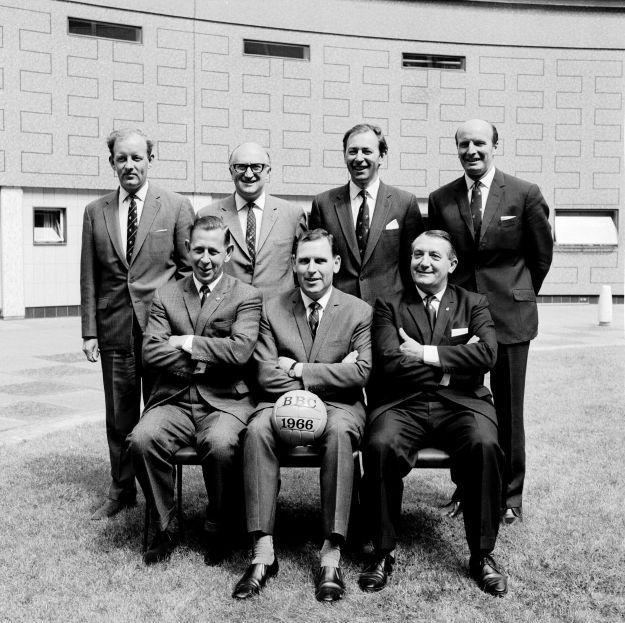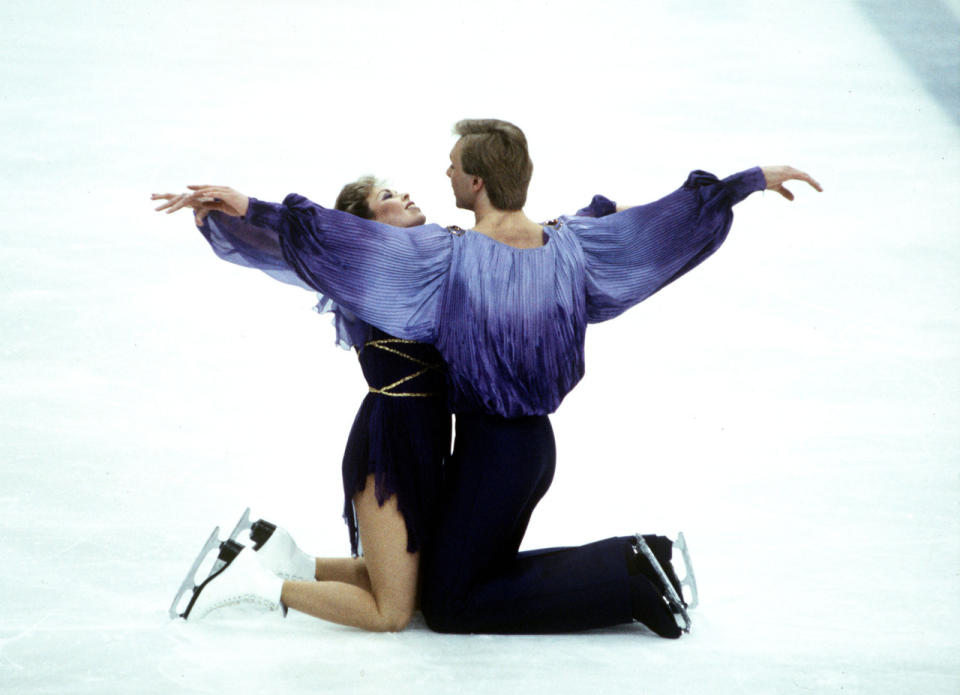yahoonick
In our weekly series, Yahoo Sport’s Nick Metcalfe features a famous voice of sport. This week, the BBC commentator and presenter Alan Weeks goes under the spotlight.

Alan Weeks was a familiar voice to all sports fans for decades. While so many of the broadcasters featured in this series have focused on one particular sport, Weeks was truly Mr Versatile.
Whether it was commentating on swimming and skating at the Olympics, describing football throughout the winter, or presenting programmes like Pot Black, Weeks was a BBC man through and through, and was respected by everyone as a voice of great authority.
Weeks, pictured between Frank Bough and David Coleman before the 1966 World Cup at the top of this feature, loved sport all his days.
Growing up in Brighton, he remembers seeing his first sporting star as a boy while at the town’s Swimming Stadium, America’s 1928 double Olympic diving champion Pete Desjardins.
That same building was later reopened as an ice rink named the Sports Stadium. It became a hugely important place for Weeks. He learnt to skate there, and supported the local ice hockey team the Brighton Tigers.
Weeks served with the British Merchant Navy during World War Two. Soon after that came his break into broadcasting. He commented on Tigers matches over the public address system. As luck would have it, BBC man Peter Dimmock, co-founder and presenter of the television programme Sportsview - the forerunner to the long-running Sportsnight - was in attendance and was impressed with what he heard.
Weeks auditioned at a match in London’s Earls Court soon after, and was so good from the start that he ended up commentating on the third period live. A long career with microphone in hand had begun.
The BBC’s first live outside broadcast from the south coast was from Brighton’s Ice Circus in 1952, and Weeks was commentator. Later in the decade, the BBC started to cover European and World Skating Championships.
It may seem unlikely to young TV viewers of today, but skating was for many years a mainstay on our screens. And Weeks became our permanent companion at the big events.
It helped of course that some of Britain’s greatest sportspeople enjoyed famous success in the 1970s and 1980s. There was John Curry, who won gold at the 1976 Winter Olympics in Innsbruck, and Robin Cousins, who claimed Olympic glory four years later at the Lake Placid Games.
And then, in 1984, came surely the most memorable sporting moment to have taken place in the broadcasting life of Weeks. A huge audience of 24 million in Britain tuned in to see Jayne Torvill and Christopher Dean perform Bolero at the Sarajevo Winter Olympics. It was a spellbinding night, with the pair earning an instant place in British sporting folklore with the quality of their performance.
Weeks reflected the drama and magic of the night brilliantly, firstly with his words straight after the mesmerising display from the British duo and then when a remarkable set of marks from the judges came through.

“They’re standing and they’re applauding that dramatic, really dramatic, performance by Jayne Torvill and Christopher Dean. Ravel’s Bolero being applauded om and on, roars around the building, and the judges now just waiting for a moment to give the marks.
“There’s the first set of marks. Do I really have to go any further? One, two, three sixes, and the rest of them 5.9. That was for technical merit. You’ve guessed it, I’ve guessed it. The second set of marks can only confirm that Jayne Torvill and Christopher Dean have won the gold medal.
“Let’s see the second one. It’s right across the board! That’s it. What a marvellous, marvellous set of marks. A complete set there. What could be more convincing? Twelve in all. That is a marvellous, marvellous end to this Olympic competition. Jayne Torvill and Christopher Dean have won the gold medal for the 1984 Olympic ice dancing competition.”
Weeks described many other memorable Olympic moments in his long career. Alongside skating, swimming and ice hockey are surely the other sports for which he will be best remembered.
He commentated on victories in the pool for David Wilkie, in the 200m breaststroke, at the 1976 Montreal Olympics, and Duncan Goodhew in the 100m breaststroke at the Moscow Games of 1980.
Weeks was particularly busy at Winter Games, combining skating duties with his beloved ice hockey. He commentated on one of the most celebrated moments in sporting history, the Americans claiming a stunning victory over the Soviet Union in 1980.
However special the moment, the BBC knew what they were getting with Weeks. Viewers did too. We were always in the safest of hands.
As with so many broadcasters in this series, particularly among those that worked in the years straight after the war, Weeks tended to be sparing with his words. He would often be silent for long periods. However, when he did speak, he tended to make it count.
Weeks was firmly of the old school, and had a real gravitas and command about him. He always had a great knowledge of his subject matter and an obvious love of the sports he was covering.
Weeks was also a football commentator for 20 years, probably not surprisingly as there was only so much skating, swimming and ice hockey to go round.
He worked at a number of World Cup finals, including the 1966 tournament in England. He will also be remembered by many Newcastle fans for being on duty when the Magpies saw off Ujpesti Dozsa to win the 1969 Fairs Cup. To this day, it is still the last time Newcastle won a major trophy.
Although predominantly a commentator, Weeks was also a notable presenter. He occasionally filled in presenting two flagship BBC programmes, Grandstand and Match of the Day.
And he was the main presenter of Pot Black, a half hourly snooker show that saw two top players taking each other on in a single frame. I wrote about the programme at length when I featured Ted Lowe in this series last month.
His longevity really was something to behold. Weeks, who had begun in the business shortly after the war, carried on until the 1990s. His final broadcast was at the World Skating Championship in Edmonton in early 1996.
He announced soon after that event that he was retiring. Sadly, Weeks died from cancer a few months later, in June 1996. He was 72.
It’s true to say have been far more famous names and more celebrated characters in this series. And if anything I’d say that Weeks has been a little underrated. If you think of the sheer quantity and quality of his work over many decades, it’s hugely impressive.
It’s nice to think we’ll always have that Bolero night. Treat yourself by watching it now. You will see that Weeks had a masterful presence in the commentary box. Another voice to be treasured.


